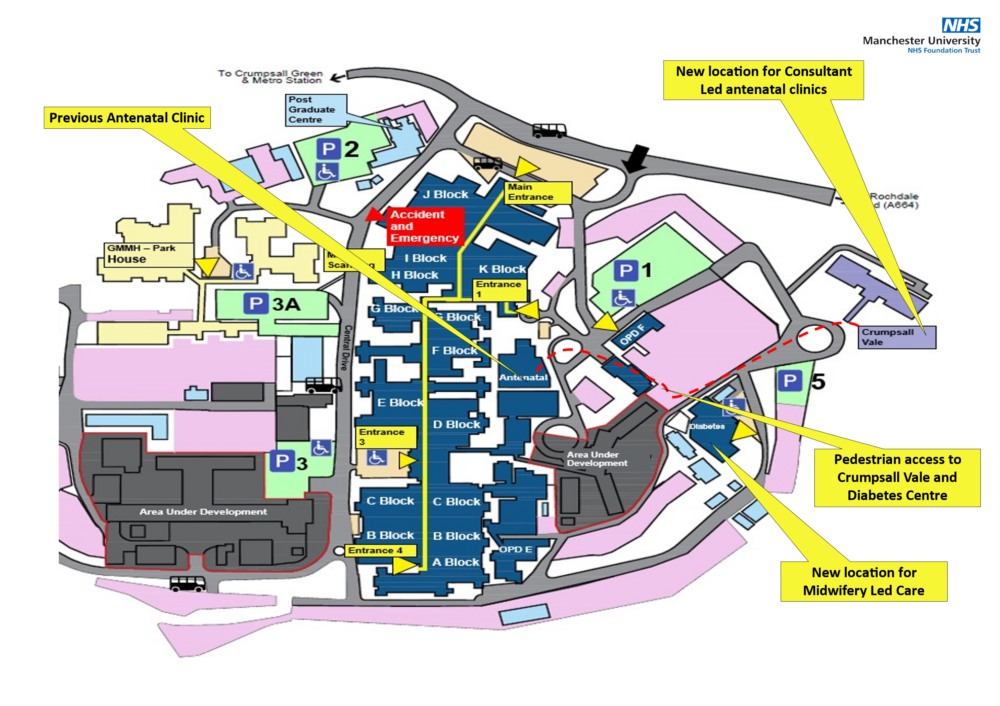This section briefly summarises general antenatal care for all women. There may be additional visits for some women, particularly if risk factors have been identified. If you need to cancel or change your appointment, the numbers to ring are:
- Saint Mary’s Hospital – (0161) 276 6409.
- Wythenshawe Hospital – (0161) 291 2951
- Lance Burn Health Centre Salford – (0161) 470 6881
- Trafford Hospital – (0161) 746 2026.
All the contact telephone numbers that you might need during pregnancy are on the front page of your handheld notes.
Up to 12 weeks
For early pregnancy advice on lifestyle, healthy eating and vitamin supplements please click here. You will be advised to take folic acid 400mcg and a minimum of 400IU (10mcg) vitamin D daily, if you aren’t already taking these. Some women may require a higher dose of the above supplements and your midwife will advise you if this is the case. Usually your first booking visit will occur early in the pregnancy. This can take time as the midwife will have a lot to discuss as well as taking all the health information that she needs to plan your care. This discussion will include:
- Your previous medical history.
- Place of birth options.
- Your occupation and maternity benefits.
- Ultrasound and blood tests offered in pregnancy.
- Screening available in pregnancy.
- Plans will be made for the best care pathway for you in pregnancy.
- Benefits of breastfeeding.
The Midwife will also measure your height, and weight, check your blood pressure and test your urine. Your midwife will discuss the vaccinations recommended in pregnancy to protect you and your baby. Influenza vaccine will be offered throughout Flu season (September-March) and Whooping cough from 16 weeks of pregnancy.
11-14 weeks
This is the gestation when you will be offered your first scan.This will be to date the pregnancy and you will have the option to undertake screening for Downs Syndrome, Edwards Syndrome and Patau syndrome. If it has been identifying at your booking appointment that you require a review by a Consultant obstetrician, then this may take place following this scan. This appointment may be face to face or virtually.
16 weeks
At this appointment, the midwife will check your blood pressure and urine. The results of blood tests taken during the booking appointment will be explained and documented and any appropriate action taken where necessary. The midwife will also discuss with you how to monitor your baby’s movements and who to contact should you have any concerns.
Further info.
18-20 weeks
At this appointment you will have a structural (anomaly) scan of the baby to check for any physical problems. If this scan is normal you will be able to go home following the scan unless an appointment with a doctor or midwife has been requested.
25 weeks
If this is your first baby, the midwife will see you to check your blood pressure and urine, and also measure the size of your baby with a tape measure over your bump. Women having second or subsequent babies do not need this appointment. You will also be given your Maternity Certificate (MATB1 form).
28 weeks
The midwife will see you to check your blood pressure and urine, and also measure the size of your baby with a tape measure over your bump. If your blood type is Rhesus negative, and your baby is Rhesus positive, you will be offered an anti-D injection at this stage.
31 weeks
If this is your first baby, the midwife will see you to check your blood pressure and urine, and also measure the size of your baby with a tape measure over your bump. Women having second or subsequent babies do not need this appointment.
34 weeks
The midwife will see you to check your blood pressure and urine, and also measure the size of your baby with a tape measure over your bump.
36 weeks
Your midwife will see you to check your blood pressure and urine, and also measure the size of your baby with a tape measure over your bump. You will also discuss the birth and how to prepare for labour, including your birth plan if you wish. Your place of birth will be confirmed with you. If you have had a healthy pregnancy, then birth will usually be planned for a midwifery-led setting (such as at home, Ingleside Birth Centre or The Manchester Birth Centre) and we will make sure you have the correct telephone numbers to ring. You will also get information about feeding and caring for your baby, vitamin K and screening tests for new-born babies, the baby blues and postnatal depression.
38 weeks
Your midwife will see you to check your blood pressure and urine, and also measure the size of your baby with a tape measure over your bump. Your midwife will also start to discuss options available if the pregnancy lasts more than 41 weeks.
40 weeks
If this is your first baby, the midwife will see you to check your blood pressure and urine, and also measure the size of your baby with a tape measure over your bump. Women having second or subsequent babies do not need this appointment. Your midwife will also discuss options available if the pregnancy lasts more than 41 weeks.
41 weeks
Your midwife will see you to check your blood pressure and urine, and also measure the size of your baby with a tape measure over your bump. The options for induction of labour, including a membrane sweep will be discussed.

 Midwives provide ongoing care throughout your pregnancy and this care is tailored to meet your individual needs and circumstances. Wherever possible you will see the same midwife, or team of midwives to ensure continuity of care. Some women will require input from a variety of professionals at different points in their pregnancy. This may include consultations with consultant obstetricians, anaesthetists, neonatologists or other specialists. Out team also includes maternity support workers and clerical staff.
Midwives provide ongoing care throughout your pregnancy and this care is tailored to meet your individual needs and circumstances. Wherever possible you will see the same midwife, or team of midwives to ensure continuity of care. Some women will require input from a variety of professionals at different points in their pregnancy. This may include consultations with consultant obstetricians, anaesthetists, neonatologists or other specialists. Out team also includes maternity support workers and clerical staff. Some of the specialist services for women across our sites include:
Some of the specialist services for women across our sites include: In this section
In this section
